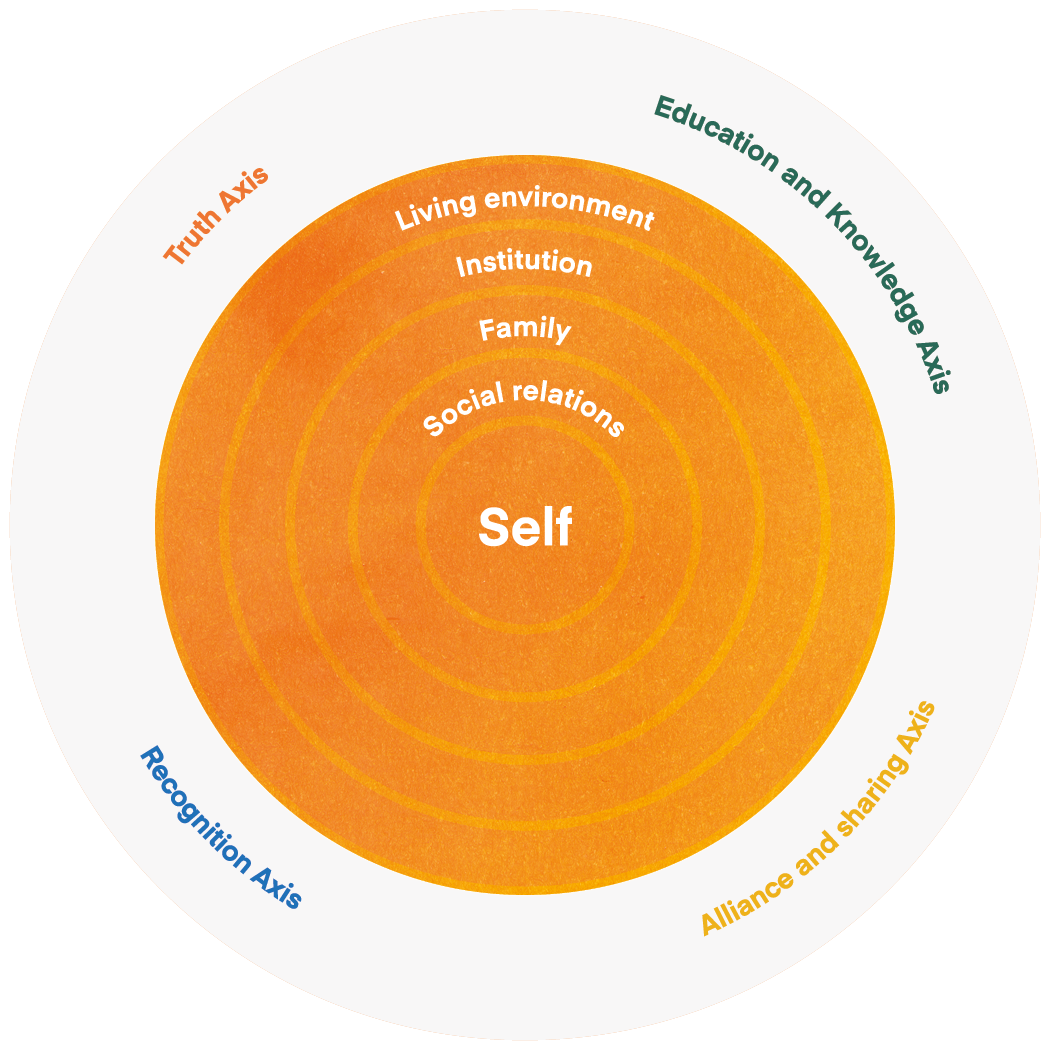- Rethinking OCAP® principles on data ownership
- Recognising Indigenous knowledge
- Establishing and maintaining co-teaching and collaborative research
- Prioritising research/programs related to Indigenous Nations issues
- Teaching on the territory
- Putting forward traditional knowledge in teaching
- Offering a course on Indigenous realities to all UQAT students

Territorial recognition
Embedding the Territorial Recognition Principle
Embedding the
Territorial Recognition Principle
The University is committed to embodying its territorial recognition principle into institutional actions, by listening to and building on an equitable and inclusive collaboration with First Peoples.
The strength of UQAT's territorial recognition principle lies in the possibility of embedding it and translating it into concrete actions.
Taking Action
It is important that everyone at the university feels concerned by the territorial recognition principle and takes the time to pursue a reflection exercise by questioning their own conceptions and preconceptions of Indigenous Peoples.
"Adidik goutc ke iji kabwin akikak I kitabinin"
"No matter where you are, you are on the territory"


A series of actions presented along 4 axes has been conceived to support the principle of territorial recognition so that everyone can make it a reality. These actions represent examples to inspire the university community; other concrete actions can be initiated along each of the axes.
Education and knowledge axis
Alliance and sharing axis
- Promoting the importance of different knowledge (facilitating complementarity)
- Using Indigenous language terms in UQAT courses and publications
- Fostering intergenerational and Indigenous/non-Indigenous relationships
- Setting up places for exchanges at UQAT and on the territory
- Setting up common spaces: cultural places to encourage encounters
- Restoring friendly relationships
- Instituting a day to honour Elders
Rocognition axis
- Creating scholarships for Indigenous students
- Encouraging the hiring of Indigenous people
- Awarding honorary doctorates to Indigenous persons
- Naming the pavilions and translating the posters
- Providing an appropriate remuneration rate for Indigenous speakers invited at UQAT
- Highlighting the fact that the names "Abitibi" and "Témiscamingue" are anicinape words, and writing them in anicinabemowin
- Offering a course on Indigenous realities to all UQAT students
- Recognizing indigenous knowledge and expertise
- Creating spaces where language is visible and alive
Truth axis
- Honouring the Elders (ancestors)
- Making visible the actions regarding territorial recognition put forward by UQAT
- Recognizing the impacts of colonialism
- Naming the pavilions in Indigenous languages
- Offering a course on Indigenous realities to all UQAT students
- Establishing a directory of Indigenous resource persons
- Training and raising UQAT staff awareness
Monitoring the Territorial Recognition Principle
In order to ensure an optimal deployment of the territorial recognition principle within UQAT, the Mamawi Mikimodan Service (working together) will be responsible for following up on the implementation of actions and will revalidate the statement content at regular intervals. This validation will allow UQAT to consolidate its relations with First Peoples and to confirm that the means used always meet the needs of the region's Indigenous people.
Examples of Concrete Actions at UQAT
UQAT has put in place actions that will be of benefit to the members of the university community, but also to its partners and Indigenous communities. These initiatives are in line with the territorial recognition principle.
- Enhancing Indigenous perspectives in teaching as part of the course EDU1701 - Introduction to the Teaching Profession, a graduate course offered by the Teaching and Research Unit in education sciences. This e-training course gives a voice to Indigenous people in one of the session's courses.
- Development of the one-credit undergraduate course SCS2220 – Introduction à la sécurisation culturelle des Premières Nations et des Inuit, offered by the Teaching and Research Unit in health sciences.
- Deployment of the training Peuples autochtones 101 : Nita kikenimicinam (Apprends à nous connaître) by UQAT's Service de la formation continue, in asynchronous mode.
- Implementation of the Concertation Space pilot project, designed for UQAT faculty members and teachers, and focused on Indigenous pedagogy.
- Creation of the of the Maamuu Table, which brings together UQAT's various departments and services; the Table allows for awareness-raising and sharing on Indigenous issues within the institution as well as externally.
- Project to set up an outdoor teaching site in Val-d'Or where Indigenous referents are present.
Information
Mamawi Mikimodan Service (working together)
mamawimikimodan@uqat.ca